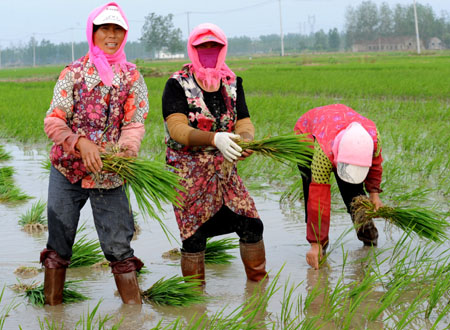
|
 |
|
Women plant rice in the field on Sunday in Ganyu county, Jiangsu province. Origo Partners Plc made its first invest in China's agricultural sector in 2010. [Photo/China Daily] |
Consulting | Cai Xiao
What other people see as a risk may be an opportunity to a venture capitalist. A case in point is Origo Partners Plc's decision to invest in China's agricultural sector.
China still has restrictions on foreign investment in agricultural production, but Chris Rynning, CEO of the company, said there are ample opportunities in the nation's agricultural processing sector, where there are fewer restrictions on foreign investment.

Origo began to look for agricultural opportunities in 2008 and its first Chinese investment was made in 2010.
Thanks to rising consumer awareness, he noted, "user preference" has been changing.
As people have more money to spend, they look forward to having not only more, but also safer food.
This coincides with the migration of many rural residents to cities for work. Farming is no longer a young person's job. In due course, because of the shrinking rural labor pool and rising costs, food prices will rise, a phenomenon China has recently experienced.
The broader picture, he said, must be that it is up to the government to step in to offer incentives and improve standards in the agricultural sector.
So, despite restrictions on breeding and planting, as stated in China's industry catalogs for foreign investment, promulgated by the State Council in 2007 and revised in 2011, international venture capital can still find more open and suitable opportunities.
Not only are there fewer restrictions in the processing industry, he said, investors also do not need to be concerned as much about natural risks, such as droughts and floods.
In the entire agricultural value chain, namely production, processing, branding, distribution and retail, foreign companies only face restrictions on production.
And this is a good industry to start in, because for a large country like China, it remains quite fragmented and underdeveloped. In every city, there is usually a group of small processing companies serving the local market and nothing else, and the need for consolidation is obvious in order to achieve economies of scale.
Unlike in other industries, where larger financial commitments do not necessarily lead to more impressive growth, the processing of farm products, at least as it is in China today, is almost a game of guaranteed results.
"The more capital the investors spend, the bigger the company they can build. The bigger company they build, the larger output they can ship to the market."
And that is a story both the Chinese government and investors would love to hear, Rynning said.
Origo is an investment and strategic consultancy advisory company that concentrates on private equity markets in China and India.
It was listed on the London Stock Exchange in 2007 and has made 23 investments, ranging from $3 million to $20 million each, two of which went into the agricultural sector.
Origo's first global agricultural investment was made in 2008 in an Australian company that produces premium grain, chicken and beef.
The original plan was to export its products to China. But later it found the demand in Australia's domestic market was already large enough to consume all of the company's products.
Its first Chinese agricultural project came in late 2010, with Dechun Rice Industry Group Ltd in Jilin province, a company specialized in rice processing.
Origo became a minority shareholder in Dechun, making an investment of more than $20 million in China Rice Ltd, the firm's holding company.
Rynning explained that Dechun's sourcing is from nearby areas in Northeast China. The company complies with the purchasing and sales framework set by the government, and therefore operates in a very well regulated sector where the margins are quite predicable.
Dechun's annual processing capacity is around 320,000 metric tons, though it is currently operating at 70 percent of its capacity. It has maintained annual growth of around 15 percent, while the industry's average annual growth rate is around 10 percent, he said.
One of Dechun's main attractions is its "very experienced" management.
Li Dechun, founder and chairman of Dechun, is a successful businessman with more than two decades of experience in the rice processing industry, Rynning said. "Li provides strong leadership and day-to-day management."
Dechun's other advantage is its knowledge of the domestic market, Rynning added. With the exception of some equipment imported from Germany, it operates mainly with technologies available in China and concentrates on the domestic market, using a "broad procurement network" and "well-established sales and distribution channels".
Dechun's products target the medium- and high-end markets, and products such as high-end japonica rice -a short-grain rice that is a central ingredient in Japanese cuisine - are sold to large retailers.
The rice processor's priority is now to expand production and sales in the domestic market, Rynning said, before it can look for different options to raise capital for further growth, including stock market listings or using more private money.
In China, some rice processing companies have already listed in domestic stock markets, such as the Heilongjiang-based Beidahuang Group and Gaea Gem Group from Hunan province.
As for Origo's strategy in the agricultural sector, Rynning said it will continue to center on the processing industry and will be aimed at helping Dechun raise its output and lower its costs.
Demand for agricultural products has been continuously rising in China.
Research from Southwest Securities Ltd, a domestic brokerage, showed that the country's annual per capita pork consumption reached 33.1 kg by the end of 2010, up 85 percent from two decades ago.
In the meantime, its annual per capita consumption of dairy products was 11.27 kg, a rise of as much as 700 percent in the past decade.
According to data from the Zero2IPO Research Center, there were 24 merger-and-acquisition deals in China's agricultural sector last year, worth $377.7 million. Eight deals, worth $49.9 million, involved venture capital or private equity funds.
China's New Hope Group, a leading feed producer, joined Agria Co in March 2011 to acquire a 50.1 percent stake in PGG Wrightson, New Zealand's largest agricultural services provider, for about $200 million.